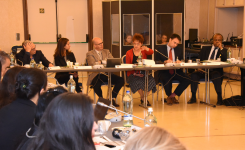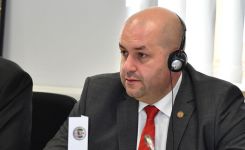- George C. Marshall European Center for Security...
- Marshall Center Seminar Examines Threats to Eur...
Marshall Center Seminar Examines Threats to Europe from the MENA Region
Marshall Center Seminar Examines Threats to Europe from the MENA Region

By Christine June
Public Affairs Office
George C. Marshall European Center for Security Studies
GARMISCH-PARTENKIRCHEN, Germany (Jan. 22, 2019) – There are those who believe that the Arab regional order is collapsing, bringing a dark period for the Middle East and North Africa Region, which will, in turn, influence Europe’s Southern Flank.
If so, what will emerge to replace it? Can it be shaped? What does the emerging regional situation mean not only for the people of the Southern Flank, but also for Europe, and its security relationships?
Fresh Ideas for Policy Recommendations
Answering these questions were 50 senior-level security practitioners from 23 nations in Africa, Europe, Eurasia and North America, who attended the European Security Seminar-South from Jan. 14 to 18 at the George C. Marshall European Center for Security Studies here. The Marshall Center is a German-American partnership that has produced generations of global security professionals for the past 25 years.
“This seminar will focus on the MENA region,” said the Marshall Center Director Keith W. Dayton, during his remarks on the seminar’s first day. “You are not expected to come up with solutions to the extremely complex problems we will present you with here, but we do ask you to think creatively, think outside the box and come up with fresh ideas.”
Dayton added, “We are asking you to channel your insights into concrete policy recommendations.”
Closer Look into a Serious Challenge
Held here for the fourth time, this one-week seminar is designed to examine the threats to Europe emanating from the Middle East and North Africa and to develop appropriate responses to regional security challenges, said the ESS-South Director Dr. Petra Weyland.
Weyland said that previous seminars addressed the dissolution of order and crisis response in the region. Last year, the focus was on demographic changes on Europe’s Southern Flank, with special attention to the growing number of young people who now make up a majority of populations of states in the region.
“Last year’s seminar explored a serious challenge and is the reason why this year we asked them to investigate this topic closely and collaboratively,” Weyland said. “We added the question is there a new regional order in the making on Europe’s Southern Flank due to the pressures of demography, war, political chaos, regional power interests, as well as great power invention to include Russia and China.
“And, what can existing security partnerships do about it?” she asked the participants.
Changing the Security Lens
To closely and collaboratively examine this topic, the seminar was built around working groups, conference-style lectures and panel discussions with faculty and guest lecturers on topics such as “Implicated Human, National and Regional Security Dimensions of the New Regional Order.”
“At work, I view the region with a particular security lens,” said Canadian Army Lt. Col. Francis Canliffe, who works at Canada’s National Headquarters, where he develops military options for Africa and the Middle East, and conducts mission review for ongoing peacekeeping operations. “The lectures and panel discussions on topics like gender and youth movement took my view to a macro level giving me not only an international view, but also the local perspective.
“The panel discussions showed that there is not a single perspective or point of view on any of these issues, which really helped to stimulate and drive some of the conversation in our working groups,” he added.
Different Perspectives of Actors in the Region
The outcome-oriented and product-driven small group workshop format was facilitated and supported by subject matter experts. Working groups looked into the strategic overview, implications for partnerships, future security partnerships, regional order and actors, and security implications. Each working group was tasked to look into these topics with an assigned perspective: Russia; United States; European Union; Organization for Security and Co-operation in Europe; and, non-state actors.
Weyland said that the results from this seminar will be published as a conference report and disseminated to U.S., Germany, European Union and NATO policymakers in order in inform strategy in the region.



